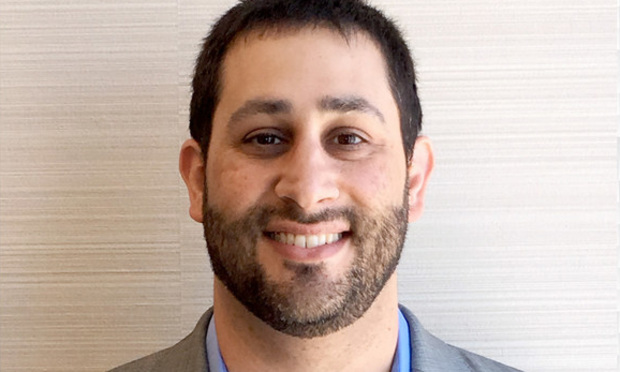New Ogletree Deakins Director of Data Analytics on the Challenges of Crunching Labor Data
Andrew Cook, the firm's new head of data analytics based in its Torrance office, said that with labor data analytics, access and reliability tend to be the biggest challenges.
May 07, 2018 at 11:30 AM
5 minute read
 Dr. Andrew Cook of Ogletree, Deakins, Nash, Smoak & Stewart.
Dr. Andrew Cook of Ogletree, Deakins, Nash, Smoak & Stewart.
Big Data is increasingly working its way into the fabric of standard law firm operations. With mounting pressure from corporate clients to curb costs and boost efficiency, more and more law firms are turning to analytics practices and data scientists to handle both data projects for clients and drive firm efficiency.
Andrew Cook, labor and employment firm Ogletree Deakins' new director of data analytics, has a strong background in big data, but will be taking his first step into the law firm world. As a labor economist for FTI Consulting and later for Los Angeles-based The Claro Group, Cook designed and implemented statistical models to guide employment processes, and has spent time training attorneys how they too can use data practices to guide process development.
Legaltech News, an affilliate of The Recorder, caught up with Cook to discuss his new role:
LTN: What initially drew you to data analytics work?
Andrew Cook: I have always been a quantitative person, but matriculated through college as a pre-med English Literature major. It wasn't until I decided that medicine wouldn't be a viable option for me (I'm terrible in biology) that I decided to utilize my more quantitative skills. I took a job as a consultant in an economic litigation company, and upon learning how valuable data could be to provide rigorous, robust results in support of arguments and conclusions, I was hooked.
What drew you specifically to the labor and employment space?
My first consulting job was as an entry-level consultant at an economic litigation firm that focused on labor and employment. Maybe it was that initial exposure, or the fact that we were able to work with large data related to tangible, real-world issues—discrimination, RIFs (reductions-in-force), compensation, hiring, etc. But as I explored other potential opportunities, I always came back to labor and employment as what I knew best, but also what I enjoyed most.
What kinds of skills and experiences do you think are most likely to inform your work with Ogletree Deakins?
I expect every skill I have in my toolbox to be leveraged constantly. The obvious skills are quantitative and focus on the ability to program in various statistical packages in order to process the relevant data and create databases that can be utilized for various internal operations analyses, as well as external consulting analyses. This information will then be used to support our clients to effectively and efficiently address the question at hand.
I am also a very big advocate of communication. Whether it is the ability to communicate with team members while working on a project, or discussing potential results with counsel or the end-client, I firmly believe that success in this role requires an understanding of how best to convey and interact with others in a constructive manner. This is how I've built relationships that result in loyalty, respect and productivity.
What are some of the biggest challenges to working with labor data?
The biggest data challenges are access and reliability. The client simply wants to run the business, and most human resources and IT professionals are already working 40-plus hour jobs. Because everyone is so time-starved, it is sometimes difficult to access data. Clarity in communication and flexibility are essential on our part in order to facilitate an efficient transfer of relevant information.
Reliability of the data can also add to the challenge of providing a cost-effective, reliable end-product. A large portion of our job is to go through the data, identify issues, and rectify them in a manner that results in a consistent, reliable analysis database, what we often refer to as “cleaning” the data.
What are some projects you're hoping to tackle in working with Ogletree?
That is an excellent question! The projects can be separated into two specific areas: client-facing projects and internal, operations-based projects. The client-facing focus will be any litigation-related opportunities currently being outsourced to consulting firms that do not require a testifying role. This will grow to include capabilities around non-litigation statistical/economic consulting. Ogletree already possesses strong internal groups, particularly those focusing on pay equity and OFCCP/EEO audits. I will work with these groups to enhance their existing capabilities.
For the internal, operations-based projects, my goal is to assist management in identifying opportunities to create greater efficiencies wherever possible. One example would be identifying areas in which data analytics can lead to more productive results.
A lot of legal groups are still pretty new to big data and analytics and are just now starting to experiment with hiring people like yourself. Are there any suggestions you have for firms who want to get started in this space?
My advice is to do your homework and choose carefully. We are here to enhance the client relationship. Individuals in this role must be able to converse with different personalities, while being able to perform robust, reliable analytics, and then distill the relevant information into an understandable format.
I would also recommend that a firm deeply understand how they envision using big data and analytics before commencing a search, as this will allow the stakeholders to identify specific skills that will most enhance their practices and lead to the greatest return on investment. It is much better to start small, and let the group evolve with the firm's needs.
This content has been archived. It is available through our partners, LexisNexis® and Bloomberg Law.
To view this content, please continue to their sites.
Not a Lexis Subscriber?
Subscribe Now
Not a Bloomberg Law Subscriber?
Subscribe Now
NOT FOR REPRINT
© 2025 ALM Global, LLC, All Rights Reserved. Request academic re-use from www.copyright.com. All other uses, submit a request to [email protected]. For more information visit Asset & Logo Licensing.
You Might Like
View All
Once the LA Fires Are Extinguished, Expect the Litigation to Unfold for Years
5 minute read

Faegre Drinker Adds Three Former Federal Prosecutors From Greenberg Traurig
4 minute read
Anapol Weiss Acquires Boutique Led by Star Litigator Alexandra Walsh
5 minute readTrending Stories
Who Got The Work
J. Brugh Lower of Gibbons has entered an appearance for industrial equipment supplier Devco Corporation in a pending trademark infringement lawsuit. The suit, accusing the defendant of selling knock-off Graco products, was filed Dec. 18 in New Jersey District Court by Rivkin Radler on behalf of Graco Inc. and Graco Minnesota. The case, assigned to U.S. District Judge Zahid N. Quraishi, is 3:24-cv-11294, Graco Inc. et al v. Devco Corporation.
Who Got The Work
Rebecca Maller-Stein and Kent A. Yalowitz of Arnold & Porter Kaye Scholer have entered their appearances for Hanaco Venture Capital and its executives, Lior Prosor and David Frankel, in a pending securities lawsuit. The action, filed on Dec. 24 in New York Southern District Court by Zell, Aron & Co. on behalf of Goldeneye Advisors, accuses the defendants of negligently and fraudulently managing the plaintiff's $1 million investment. The case, assigned to U.S. District Judge Vernon S. Broderick, is 1:24-cv-09918, Goldeneye Advisors, LLC v. Hanaco Venture Capital, Ltd. et al.
Who Got The Work
Attorneys from A&O Shearman has stepped in as defense counsel for Toronto-Dominion Bank and other defendants in a pending securities class action. The suit, filed Dec. 11 in New York Southern District Court by Bleichmar Fonti & Auld, accuses the defendants of concealing the bank's 'pervasive' deficiencies in regards to its compliance with the Bank Secrecy Act and the quality of its anti-money laundering controls. The case, assigned to U.S. District Judge Arun Subramanian, is 1:24-cv-09445, Gonzalez v. The Toronto-Dominion Bank et al.
Who Got The Work
Crown Castle International, a Pennsylvania company providing shared communications infrastructure, has turned to Luke D. Wolf of Gordon Rees Scully Mansukhani to fend off a pending breach-of-contract lawsuit. The court action, filed Nov. 25 in Michigan Eastern District Court by Hooper Hathaway PC on behalf of The Town Residences LLC, accuses Crown Castle of failing to transfer approximately $30,000 in utility payments from T-Mobile in breach of a roof-top lease and assignment agreement. The case, assigned to U.S. District Judge Susan K. Declercq, is 2:24-cv-13131, The Town Residences LLC v. T-Mobile US, Inc. et al.
Who Got The Work
Wilfred P. Coronato and Daniel M. Schwartz of McCarter & English have stepped in as defense counsel to Electrolux Home Products Inc. in a pending product liability lawsuit. The court action, filed Nov. 26 in New York Eastern District Court by Poulos Lopiccolo PC and Nagel Rice LLP on behalf of David Stern, alleges that the defendant's refrigerators’ drawers and shelving repeatedly break and fall apart within months after purchase. The case, assigned to U.S. District Judge Joan M. Azrack, is 2:24-cv-08204, Stern v. Electrolux Home Products, Inc.
Featured Firms
Law Offices of Gary Martin Hays & Associates, P.C.
(470) 294-1674
Law Offices of Mark E. Salomone
(857) 444-6468
Smith & Hassler
(713) 739-1250






